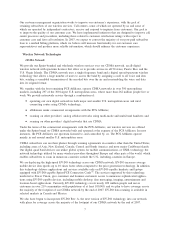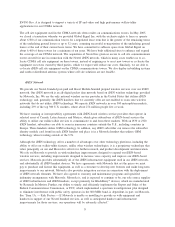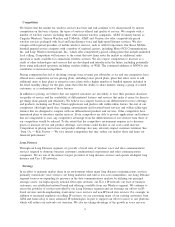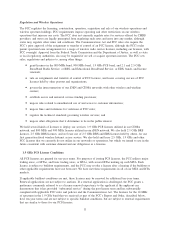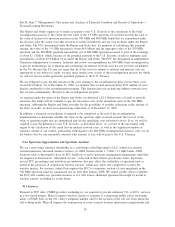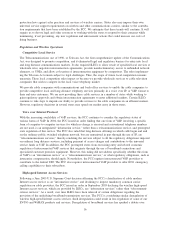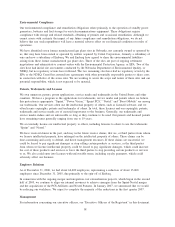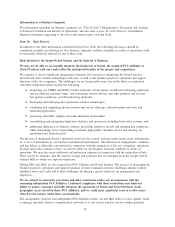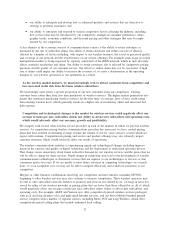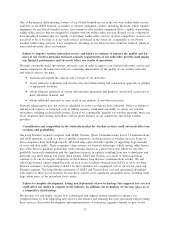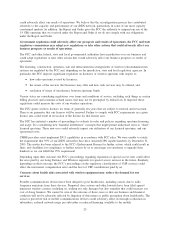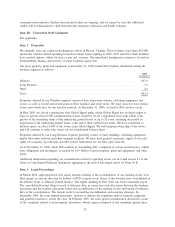Sprint - Nextel 2006 Annual Report Download - page 19
Download and view the complete annual report
Please find page 19 of the 2006 Sprint - Nextel annual report below. You can navigate through the pages in the report by either clicking on the pages listed below, or by using the keyword search tool below to find specific information within the annual report.“net neutrality.” Proponents of “net neutrality” assert that operators of broadband transmission facilities should
not be permitted to make distinctions among content providers for priority access to the underlying facilities.
A net neutrality mandate could adversely affect the operation of our networks that utilize EV-DO and WiMAX
technologies by constraining our ability to control the network and enter into innovative business arrangements
with third-party content providers. Additionally, the FCC has a pending proceeding to consider whether all
high-speed Internet access services, regardless of the technology used, are subject to various FCC consumer
protection regulations. The imposition of any such obligations could result in significant costs to us.
Other Regulations
Access Charge Reform and Universal Service Requirements
Incumbent local exchange carriers, or ILECs, and other carriers impose access charges for the origination and
termination of long distance calls upon wireless and long distance carriers, including our Wireless and Long
Distance segments. Also, interconnected local carriers, including our Wireless segment, pay to each other
reciprocal compensation fees for terminating interconnected local calls. In addition, ILECs impose special
access charges for their provision of dedicated facilities to other carriers, including both our Long Distance
and Wireless segments. These fees and charges are a significant cost for our Wireless and Long Distance
segments. There are ongoing proceedings at the FCC related to access charges and special access rates, which
could impact our costs for these services.
Communications carriers also pay fees into and receive revenues from the USF, established by the FCC and
many states. The federal USF program funds services provided in high-cost areas, reduced-rate services to
low-income consumers, and discounted communications and Internet services for schools, libraries and rural
health care facilities. The USF is funded from assessments on communications providers, including our
Wireless and Long Distance segments, who must make contributions into the fund. Our contributions to the
federal USF are based on separate FCC-prescribed percentages of our interstate and international end-user
revenues from telecommunications services for our Wireless and Long Distance segments. The FCC is
considering changing the interstate revenue-based assessment with an assessment based on telephone numbers
or connections to the public network, which could impact the amount of our assessments. As permitted, we
assess customers for these USF charges. The FCC is considering changing the way it distributes federal USF
support to carriers. In particular, FCC or state actions could make it more difficult for our Wireless segment,
which currently receives support in 24 states as an Eligible Telecommunications Carrier, or ETC, to qualify
for and to receive support. Further restrictions on our ETC status at the federal and state levels could result in
the rescission of our ETC status.
CALEA Requirements
The Communications Assistance for Law Enforcement Act, or CALEA, requires telecommunications carriers,
including us, to modify equipment, facilities and services to allow for authorized electronic surveillance based
on either industry or FCC standards. Our CALEA obligations have been extended to data and VoIP networks,
with which we are required to be compliant by May 2007.
Privacy-Related Regulations
We comply with FCC-mandated rules that limit how carriers may use customer proprietary network
information, or CPNI, for marketing purposes, and specify what carriers must do to safeguard CPNI held by
third parties. It has recently been reported that the call detail records of both wireline and wireless telephone
customers are available from certain Internet-based vendors. Congress has enacted, and state legislatures are
considering, legislation to criminalize the sale of call detail records and to further restrict the manner in which
carriers make such information available. The FCC is investigating these practices and is examining whether
existing regulations with respect to CPNI require revision or expansion, which could result in additional costs
to us, including administrative or operational burdens on our customer care, sales, marketing and IT systems.
17


